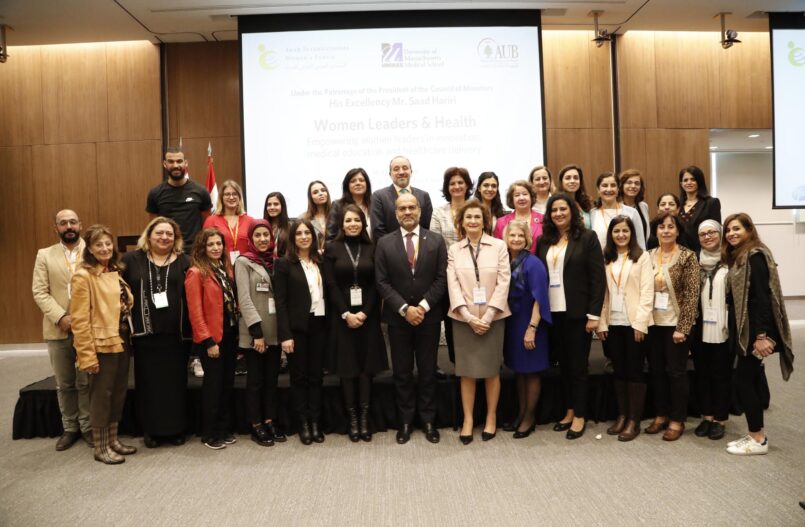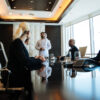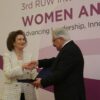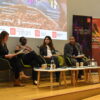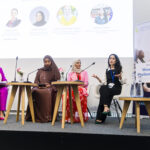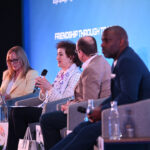In June 2019, following the highly successful conference in Beirut on Women Leaders & Health, AIWF was proud to launch a Special Report which documents the high-level and impact-oriented recommendations to emerge from the conference and workshop discussions that took place in Beirut on 17 – 18 April 2019.
Recommendations to emerge from the observations and valued contributions of all distinguished speakers covered the importance of role modelling and making successful women leaders in the field visible to girls and young women to inspire the interest of girls in medicine and STEM careers from an early age; supporting inter-disciplinary initiatives to empower women in medical education taking best practice from other disciplines; recognising that the trajectory of women’s career paths differs from men’s; emulating the highly successful Athena SWAN Awards programme in the MENA universities; and investing in research data in Arabic that measures the engagement of women in all STEM sectors, specifically medicine.
The full Report and Recommendations are available in both English and Arabic for download from the AIWF website (www.aiwfonline.com), and upon publication were widely shared by AIWF with all partners and key contacts across the governmental, private sector and international development spheres, including the World Bank, the League of Arab States, UN organisations and agencies, the European Bank for Reconstruction and Development (EBRD), the International Labour Organisation (ILO), the Food and Agriculture Organization of the United Nations (FAO), the United Nations Development Programme (UNDP), the Economic and Social Commission for Western Asia (ESCWA), USAID, United Nations agencies and the MENA-OECD Investment Programme.
AIWF now looks with great optimism to carrying the Women Leaders & Health initiative forward into the future and to working closely with all partners and participants to promote and action the many valuable recommendations to emerge from the conference. The AIWF Board, AIWF Global and Institutional Partners, and international members remain available to all valued stakeholders for fruitful co-operation on future initiatives towards realising the recommendations of our conference in the region and towards achieving economic security, prosperity and progress for all.
Highlights | Key Recommendations from Women Leaders & Health Special Report & Recommendations
- Importance of role modelling and inspiring the interest of girls in medicine and STEM subjects at an early age, requiring a societal shift to channel female school leavers into world-class medical programmes, preparing them fully for the rigour of medical studies, and raising awareness of the importance of their role in cultivating a gender diverse medical workforce in the region. Support for lifelong learning is essential to empower women to remain competitive in their skills and training at every stage of their professional journeys.
- Empowering and engaging women in medical education with more inter-disciplinary initiatives, conferences, panels, working groups, task forces, and action. While there are numerous mentorship programs in place in medical education, mentoring of groups underrepresented in academic medicine (e.g., women) remains short of meeting the demands of the workforce and it is recommended that mentorship programmes be designed to specifically support women’s leadership in medicine and in academic medicine.
- Recognising that women’s career development paths differ from mens’, career trajectories do not occur in a straight line, and many women are deterred by other priorities (such as family responsibilities). More importance should be given to work/ life balance and mindfulness, starting at medical school.
- Emulating the UK Athena SWAN Awards programme in MENA universities would enable departments and universities to develop action plans aimed at improving recruitment, retention and promotion of female academic and research staff.
- Research data in Arabic in many sectors is lacking in the MENA region, and figures that can inform research on women’s participation and challenges in medical education and healthcare delivery do not sufficiently exist. Collecting and tracking data and statistics is vital as the current situation for women in medicine and STEM must be measured as a baseline in order to chart progress and outcomes of various initiatives. More data needs to be collected about existing women in the healthcare sector workforce. promoting and valuing research based on the data. Linking academia more deeply with industry will help research data remain contemporary with the needs of the time.
- Launching an Arab Healthcare Women’s Association chapter, similar to the American Medical Women’s Association (https://www.amwa-doc.org/), as an online platform where women in the healthcare field can share resources, experiences, and support each other.
- Mainstreaming women refugees’ issues within national health strategies, and to move to strategic planning instead of individual and temporary solutions. Localizing interventions and building capacity of health services on gender-based violence is also key. Building trust between the health sector, gender-based violence specialists and the refugee community, as well as developing quality indicators to measure to progress of the health sector’s work with women refugees, would strengthen synergies between all relevant stakeholders working with women refugees.
- Projects should always address the gender dimension and have clear indicators to monitor progress for women. It is imperative that we move beyond humanitarian assistance to development assistance, which includes capacity building for refugees and creating economic opportunities including jobs programs to help young people and refugees into work.
Please visit AIWF Special Reports for the full Special Report & Recommendations for Women Leaders & Health.




